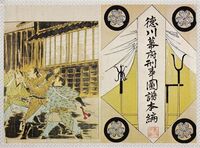Pictorial Book on the Penal Affairs of the Tokugawa Government
徳川幕府刑事図譜 (Japanese)
Description
The Pictorial Book on the Penal Affairs of the Tokugawa Government is a propaganda book which uses illustrations to compare law enforcement practices conducted by the Tokugawa government (1603-1868) with new modern methods used by the Meiji government (1868-1912). This book is published in both Japanese and English. The torture images in this book have been widely reproduced in both vanilla and SM books and websites.
Author
Publishers and Editors
Editor: Shintaro Fujita
Publication Dates
1893, 1972
History
Contents
- Preface
The Preface to the book reads in English (all typos are original to the text):
"Since a revolution of the first year of Meidi (1863) Japan had changed all the conditions of state, and is now at the wonder ful Progress of civilization, so that it is administrated by the constitutional goverment. Long before the revolution Japan was governed by a Despotism of shoguns or Taikuns. The punishments of this time wore very creul, so as indicated by this picturebook. No longer Japanese almost memory these creulties, and therefore this has now become one of japanese history. The book is divided into three parts, each containing a blief explanation: 1. Commiting the crims, 2 old Punishments by shoguns, which are the plincipal subject of this work, 3 Justices of our time: On compariny these facts you will understand how Japan is presently changing and civilizating its state
June 10, the 26 year of Meidi(1893)
Author."
- Forward
- Introductory remarks
- Illustrated examples of Tokugawa era crime and punishment
- Illustrated examples of Meiji era crime and punishment
Interesting points
The Meiji University Criminal Meuseum once hosted a digital copy of this book on their website. Meiji University's introduction to the books says:
"1 The Significance of “The Pictorial Book on the Penal Affairs of the Tokugawa Government
This work was printed in 1893 (Meiji 26) and is a vivid depiction of the world of crime and punishment during the Edo era. The Tokugawa government of that time existed for more than 250 years and finally fell in 1868. We are showing these sixty-three illustrations as a report on crime prevention in that difficult-to-imagine world of the Tokugawa shoguns.
The illustrations – a story of rewarding good and punishing evil – unfold like a series of picture cards. Their composition impresses the viewer as he or she realizes how much has changed since these were drawn during the Civilization and Enlightenment Movement of the following era, the Meiji period. The “Pictorial Book” is a living witness to the history of punishment in the Edo era. It is in the collection of the Meiji University Museum and often used in publications, but still insufficiently known in its entirety."
